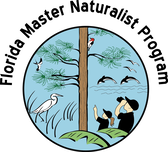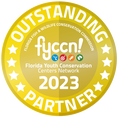UF/IFAS Florida Master Naturalist Program
Course Descriptions & Information
Statewide, non-credit, adult environmental education program
ideal for anyone wanting to learn more about natural Florida.
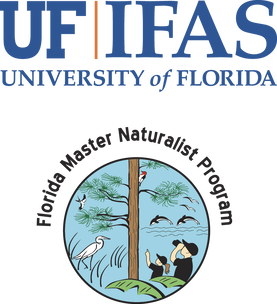
- Adult, non-credit courses
- No prerequisites
- All FMNP courses are taught in Pinellas County by us on a rotational basis
- Learn what courses Sensing Nature is offering this year
- Classroom Sessions and Field Experiences
- Classroom locations vary; we partner with multiple host locations throughout Pinellas County
- Field trip locations may be local or regional
- Take as many of the FMNP courses as you like in any order
- Graduates are listed on UF/IFAS FMNP database
- No comprehensive examination is required
At the end of the course, each student will receive their Certification of Course Completion and will be included in the UF FMNP Graduate Database. Upon course completion, each graduate will also receive the FMNP embroidered patch and a course-specific lapel pin.
|
FMNP Core Modules
|
FMNP Special Topics
Land Steward Series
|
FMNP Special Topics
Restoration Series
|
FMNP Core Module Courses:
Certificate: Graduates of all 3 Core Modules are certified “Florida Master Naturalists”
Each FMNP Core Module includes 40 hours of classroom instruction, field trips, and practical interpretive experience related to the general ecology, habitats, vegetation types, wildlife, and conservation issues of Florida’s freshwater, coastal or upland environments. The program enhances naturalist interpretation skills and addresses environmental ethics through field trips, instructional videos, and presentations for each Core Module.
Requirements: 18 years of age or older, enthusiasm, attendance, completion of interpretative talk and final project. No requirement to have previously taken any of the FMNP Special Topics to enroll in a Core Module. No comprehensive examination required.
- 3 Core Modules - Freshwater, Coastal, and Upland Systems
- 40 contact hours each; 120 hours for the complete series
- Take as many, or as few, of the Core Modules as you'd like
- No prerequisites, or order of enrollment for the courses
- Registration is through UF FMNP's registration page
- Learn what courses Sensing Nature is offering this year
Certificate: Graduates of all 3 Core Modules are certified “Florida Master Naturalists”
Each FMNP Core Module includes 40 hours of classroom instruction, field trips, and practical interpretive experience related to the general ecology, habitats, vegetation types, wildlife, and conservation issues of Florida’s freshwater, coastal or upland environments. The program enhances naturalist interpretation skills and addresses environmental ethics through field trips, instructional videos, and presentations for each Core Module.
Requirements: 18 years of age or older, enthusiasm, attendance, completion of interpretative talk and final project. No requirement to have previously taken any of the FMNP Special Topics to enroll in a Core Module. No comprehensive examination required.
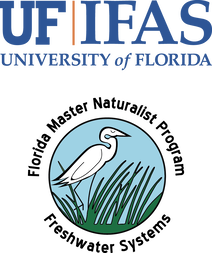
1. Freshwater Systems Core Module: Through classroom, field trips, and practical experience, this Module provides instruction on the general ecology, habitats, vegetation types, wildlife, and conservation issues of freshwater wetlands in Florida: Marshes, Swamps, and Permanent Wetlands (lakes, rivers, springs, and streams). The program also addresses society’s role in wetlands, develops naturalist interpretation skills, and discusses environmental ethics.
Upon graduation, you earn the certification title of
"Freshwater Florida Master Naturalist."
Upon graduation, you earn the certification title of
"Freshwater Florida Master Naturalist."

2. Coastal Systems Core Module: Through classroom, field trips, and practical experience, this Module provides instruction on the general ecology, habitats, vegetation types, wildlife and conservation issues of coastal systems in Florida: Coastal Uplands, Estuarine, and Nearshore Marine Environments. The program also addresses society’s role in coastal areas, develops naturalist interpretation skills, and discusses environmental ethics.
Upon graduation, you earn the certification title of
"Coastal Florida Master Naturalist."
Upon graduation, you earn the certification title of
"Coastal Florida Master Naturalist."
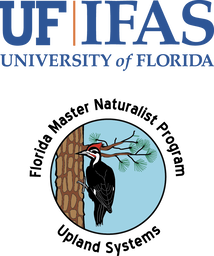
3. Upland Systems Core Module: Through classroom, field trips, and practical experience, this Module provides instruction on the general ecology, habitats, vegetation types, wildlife, and conservation issues of upland habitats in Florida: Hardwood Forests, Pinelands, and Scrub, Dry Prairie, Rangelands and Urban Greenspaces. The program also addresses society’s role in uplands, develops naturalist interpretation skills, and discusses environmental ethics.
Upon graduation, you earn the certification title of
"Upland Florida Master Naturalist."
Upon graduation, you earn the certification title of
"Upland Florida Master Naturalist."
FMNP Special Topic Courses:
Certifications:
General Info: Each 24-hour Special Topic is an adult environmental education class designed to provide detailed information and/or hands-on skills in a specific subject area. The objectives are to provide participants with additional knowledge and skills making them more effective educators, citizen scientists, and informed participants when engaging in conservation issues. The knowledge and skills gained will ultimately improve graduates’ abilities to contribute to environmental education, scientific data collection, and conservation planning efforts. Each Special Topic course includes classroom presentations, class discussions and either a planned activity or field trip to practice techniques or review learned concepts.
Requirements: 18 years of age or older, enthusiasm, attendance, and participation. No requirement to have previously taken any of the FMNP Core Modules (Freshwater Systems, Coastal Systems, Upland Systems) or any FMNP Special Topics to enroll in a Special Topic Course. No comprehensive examination is required.
- 2 series options - Land Steward Series and Restoration Series
- 4 courses in each series
- 24-contact hours for each course (96 hours per series)
- Take as many or as few of the Special Topics courses as you'd like
- No prerequisites, or order of enrollment for the courses
- Registration is through UF FMNP's registration page
- Learn what courses Sensing Nature is offering this year
Certifications:
- Each graduate will be certified in each individual course.
- Graduates of all 4 Land Steward Special Topics are Certified “Florida Master Naturalist Land Stewards.”
- Graduates of 4 of the Restoration Special Topics will be Certified "Restoration Florida Master Naturalists."
General Info: Each 24-hour Special Topic is an adult environmental education class designed to provide detailed information and/or hands-on skills in a specific subject area. The objectives are to provide participants with additional knowledge and skills making them more effective educators, citizen scientists, and informed participants when engaging in conservation issues. The knowledge and skills gained will ultimately improve graduates’ abilities to contribute to environmental education, scientific data collection, and conservation planning efforts. Each Special Topic course includes classroom presentations, class discussions and either a planned activity or field trip to practice techniques or review learned concepts.
Requirements: 18 years of age or older, enthusiasm, attendance, and participation. No requirement to have previously taken any of the FMNP Core Modules (Freshwater Systems, Coastal Systems, Upland Systems) or any FMNP Special Topics to enroll in a Special Topic Course. No comprehensive examination is required.
Land Steward Series:

1. Conservation Science Course - Land Steward Series: Educates students in concepts, language, and science about conservation needs, planning, and action. Graduates will better understand the complexities of conservation making them both better educators and participants in local conservation efforts. Concepts include species diversity, measuring biodiversity, processes generating and maintaining biodiversity, conservation history/planning strategies. ecosystem services, ecological processes, habitat fragmentation and other human activities' effects.
Upon graduation, you earn the certification title of "Conservation Science Florida Master Naturalist."
Upon graduation, you earn the certification title of "Conservation Science Florida Master Naturalist."
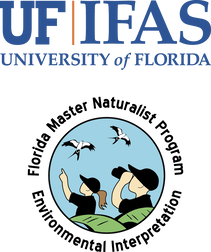
2. Environmental Interpretation Course - Land Steward Series: Graduates become better environmental interpreters and educators, so that others may learn from them about Florida’s natural history and conservation issues. Concepts taught include fundamentals of interpretation, key elements of an effective interpretive program, how to create themes, sub-messages and transitions, group management, addressing diverse audience needs, developing interpretive displays and practicing interpretive techniques.
Upon graduation, you earn the certification title of
"Environmental Interpretation Florida Master Naturalist."
Upon graduation, you earn the certification title of
"Environmental Interpretation Florida Master Naturalist."

3. Habitat Evaluation Course - Land Steward Series: Provides training in principles and commonly used techniques for evaluating wildlife habitat. Graduates will better understand the reasons for evaluating wildlife habitat at different scales and the methodologies used. Both classroom instruction and hands-on experience are included and will better equip students to participate in data collection for habitat evaluation projects. This course covers Large-scale Habitat Evaluation, Local-scale Habitat Evaluation, and Water Quality Monitoring.
Upon graduation, you earn the certification title of
"Habitat Evaluation Florida Master Naturalist."
Upon graduation, you earn the certification title of
"Habitat Evaluation Florida Master Naturalist."

4. Wildlife Monitoring Course - Land Steward Series: Provides training in principles and commonly used techniques for surveying and monitoring wildlife. Graduates better understand the reasons for monitoring wildlife and the methodologies used. The course includes both classroom instruction and hands-on experience to better equip students to participate in data collection for wildlife monitoring projects. Topics include surveying and monitoring mammals, birds, and herpetofauna.
Upon graduation, you earn the certification title of
"Wildlife Monitoring Florida Master Naturalist."
Upon graduation, you earn the certification title of
"Wildlife Monitoring Florida Master Naturalist."
Restoration Series:

1. Coastal Shoreline Restoration Course - Restoration Series: This course provides training in the restoration of living shorelines, oyster reefs, mangroves, and marsh, with focus on ecology, benefits, methods, and monitoring techniques. Graduates will be better prepared to promote and assist with restoration projects.
Upon graduation, you earn the certification title of
"Coastal Shoreline Restoration Florida Master Naturalist."
Upon graduation, you earn the certification title of
"Coastal Shoreline Restoration Florida Master Naturalist."

2. Marine Habitat Restoration Course - Restoration Series: This course provides training in the restoration of seagrass meadows, coral reefs, and sponge habitats, as well as information about artificial reefs. Graduates will be better prepared to promote and assist with restoration projects.
Upon graduation, you earn the certification title of
"Marine Restoration Florida Master Naturalist."
Upon graduation, you earn the certification title of
"Marine Restoration Florida Master Naturalist."

3. Invasive Plants - Restoration Series: This course provides understanding about how invasive plants impact Florida’s natural areas and the roles we can play to help mitigate their impacts. The information provided in this course will provide you with valuable knowledge about invasive plants, the threats they pose to native biodiversity and ecosystem function, and information to share with others to help stop the spread of invasive plants in Florida’s natural areas.
Upon graduation, you earn the certification title of
"Invasive Plant Florida Master Naturalist."
Upon graduation, you earn the certification title of
"Invasive Plant Florida Master Naturalist."

4. Freshwater Restoration - Restoration Series
Wetlands are among the most productive ecosystems in the world, which is why they’ve been coined the name “biological supermarkets.” Recognizing the importance of freshwater ecosystems is the first step toward protecting and, when necessary, restoring them.
The course includes examples of actions citizens can implement on small scales to enhance and restore ecological functions in freshwater environments. This course provide participants with examples of small-scale and large-scale restoration strategies in freshwater ecosystems.
Upon graduation, you earn the certification title
"Freshwater Restoration Florida Master Naturalist."
Wetlands are among the most productive ecosystems in the world, which is why they’ve been coined the name “biological supermarkets.” Recognizing the importance of freshwater ecosystems is the first step toward protecting and, when necessary, restoring them.
The course includes examples of actions citizens can implement on small scales to enhance and restore ecological functions in freshwater environments. This course provide participants with examples of small-scale and large-scale restoration strategies in freshwater ecosystems.
Upon graduation, you earn the certification title
"Freshwater Restoration Florida Master Naturalist."
Sign up for your class today.
All registration is through the UF/IFAS FMNP website.
All registration is through the UF/IFAS FMNP website.




















